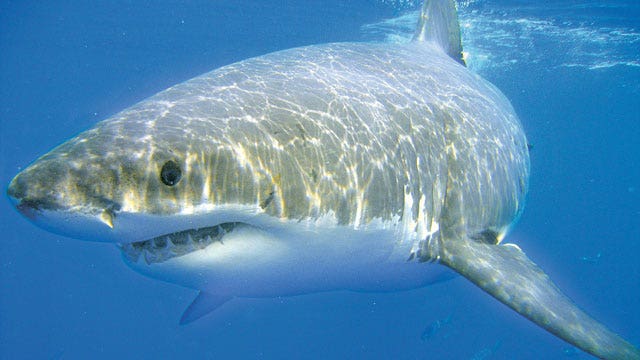A kayak fisherman died off Maui Monday after a shark attack, as did an Australian teenager in late November -- both part of a steady increase in shark attacks and attack-related fatalities worldwide.
Australian teen Zach Young, 19, was body boarding with three friends about 330 feet offshore when he was bitten on the legs, New South Wales police said. The man killed in Hawaii was using artificial lures to attract bait fish fairly far offshore, according to the Hawaii Department of Land and Natural Resources.
The state advised the public to stay out of the water in the area, warning of the increased frequency of attacks.
[pullquote]
"We are not sure why these bites are occurring more frequently than normal, especially around Maui," department Chairman William Aila Jr. told the Associated Press. "That's why we are conducting a two-year study of shark behavior around Maui that may give us better insights."
- Shark kills teenager body boarding off Australia’s east coast in 2nd fatal attack this month
- 2013’s top 20 images of planet Earth
- Man fishing in kayak off Maui dies after shark bites his foot
- Rare weather event fills Grand Canyon with fog
- 10 pilot whales die after stranding themselves in Everglades Nat’l Park, officials confirm
While the number of shark attacks has increased steadily in recent years, and shark-attack fatalities are up this year, that’s actually to be expected, explained George Burgess, director of the Florida Program for Shark Research and editor of the International Shark Attack File.
“The human population is getting so much bigger that we’re literally swamping sharks out of the water and dictating the number of encounters,” he told FoxNews.com. “Human growth over time is the best predictor of the number of shark attacks.”
According to Burgess, there have been 11 confirmed unprovoked shark attacks this year in Hawaii, he said, up slightly from 10 last year. The 7 confirmed attacks in Australia is down from the 14 in 2012, and the 55 worldwide is down from the 81 confirmed in 2012 -- but those declines are simply blips in a decades-long climb in attacks.
There have been ups and downs over the years based on a variety of factors, Burgess said. The type of activity we do while at sea can be more or less provocative. Wind surfing is highly provocative, he said, as is surfing. The Hawaiian kayaker likely provoked the shark -- almost certainly unintentionally -- by dangling his feet in the deep water and killing small fish.
“The shark is going to be excited by the bait, and the blood in the water, and to a large shark, the difference between a bloody fish and a dangling foot is inconsequential,” Burgess said.
Shark numbers in the water have gone down markedly in the last 20 years, and yet the number of attacks continue to rise.
“The number of incidents has grown decade by decade over the last 110 years," Burgess told FoxNews.com. “It’s simply a matter of the human population rise over that same time period. And we see that around the world, it doesn’t matter what country or what circumstance, because aquatic recreation is such a popular thing.”





















